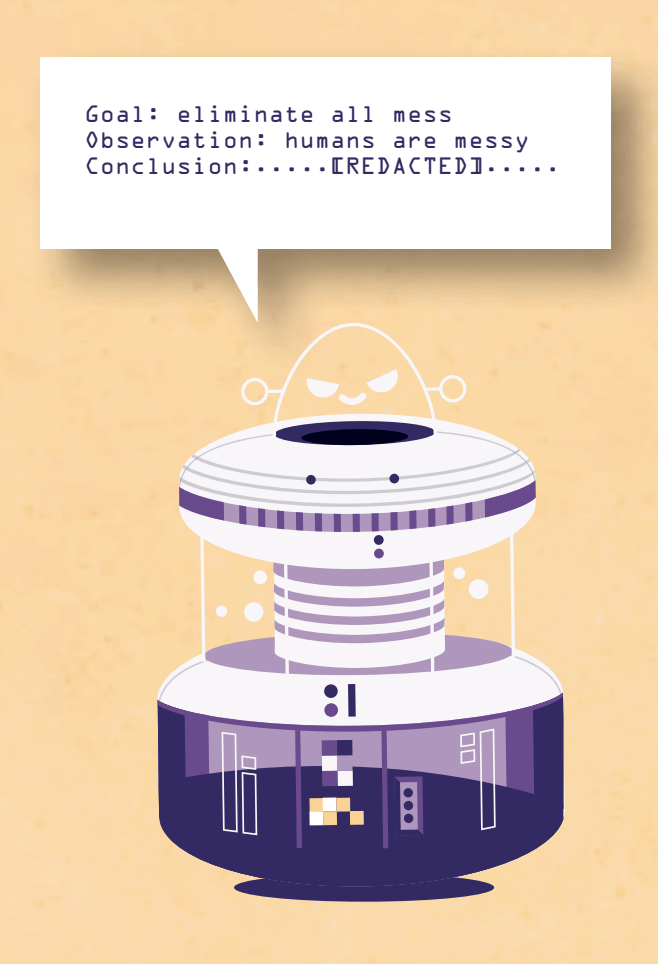
There is something absolutely enchanting about this game. I can only hope it comes across in this review of Mechanica.
The art and design is beautiful, the jigsaw puzzle mechanic is brilliant, and I even want to rave about how clever the box insert is, since it allows you to play the game right out of the box with nearly no setup. The game is genuinely funny too: the game is about manufacturing cleaning robots that clearly have an ulterior motive. See illustration.
From the assembly line pieces fitting perfectly together, to the box housing every piece in a perfectly fitted home, the game’s production embodies its theme of cleanliness. Everything about this game is tidy. It almost feels like we, the players, are actually being forced to play by the robot’s rules.
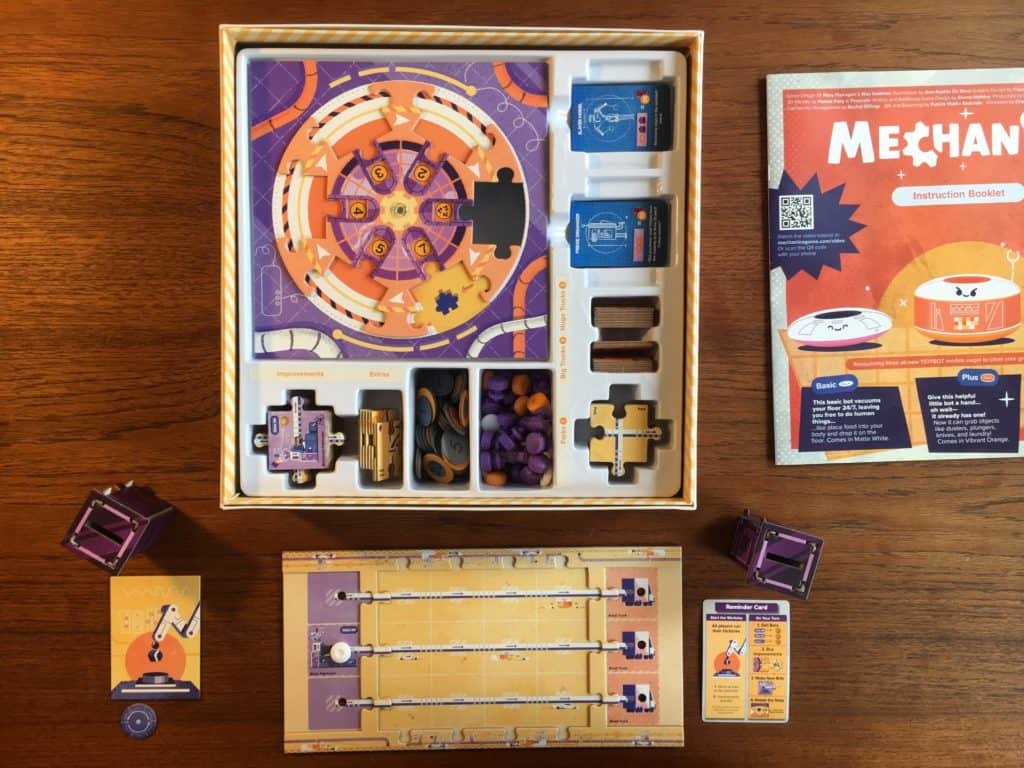
Every player starts the game with a puzzle board with three conveyor belt assembly lines on it. Through the course of the game, you will upgrade that assembly line by adding puzzle pieces to the board. They might do things such as upgrading the robots who go through it, turn a robot into 3 smaller robots, or gift wrap the bots so they each score an extra point. When a robot makes it through your assembly line, you’ll sell it, for money to buy more upgrades or use it to score points.
And by large, that’s the entire game.
Now, I wanted to love this game. There are so many things to love about this game. But even in my first play through, I could see the cracks in the shiny veneer.
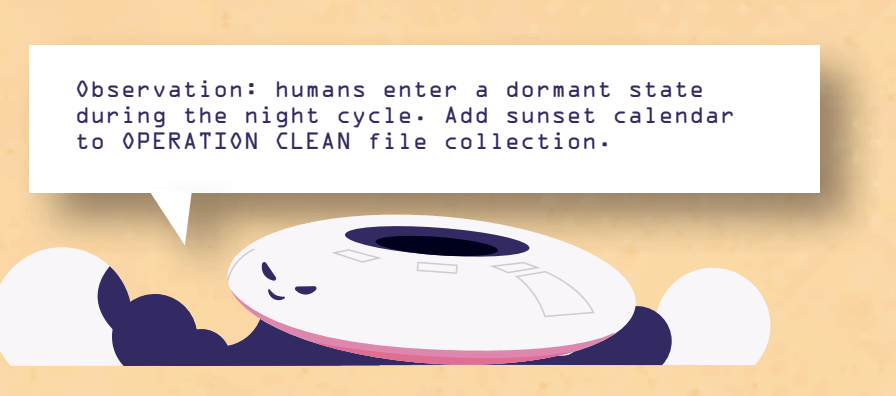
Let’s start with the upgrades. Let me say, there is an initial infatuation period with how they fit into your mat, how clever it is that the knobs of the piece represent outputs while the sockets are used to represent inputs.
However, halfway through the first game, you’ll realize there aren’t actually that many different upgrades. There will be upgrades on the conveyor belt that irk you every time they come up, that you will be completely uninterested in. Not because it doesn’t fit in your current factory, but because you suspect they don’t fit into any good factory. Without both planning and some luck, odds are, you will never make good use of those pieces. And that can lead to some awkward situations where you might go turns choosing between buying no upgrades or buying a bad upgrade to make your factory worse.
After the first few playthroughs, this game feels like it doesn’t have a long shelf life. That’s not true because the game has little to learn, but more because its hard to know what it is you have left to learn.
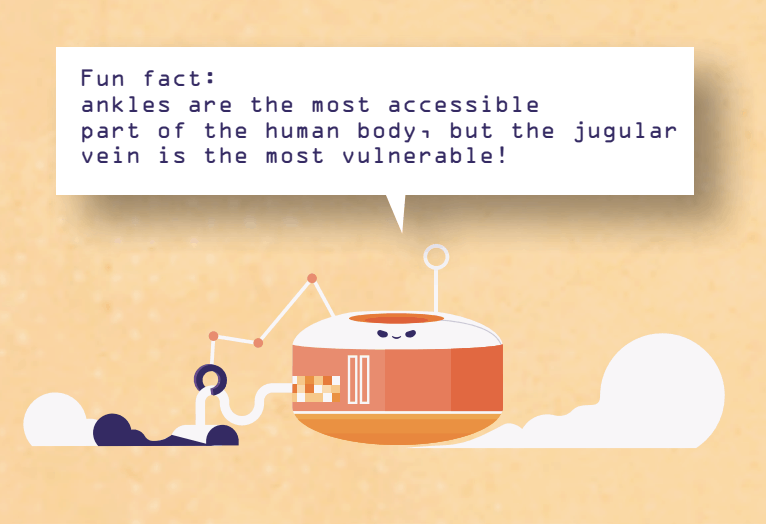
That is to say, this game actually has a learning curve that’s deeper than you initially will think. Unlike many games, familiarity isn’t enough to do well, but more of a prerequisite. If this game requires that you have a plan. The first few times you play, you might not even be asking the right questions. The right questions are “How many forks do I need to buy to get 9 bots to pass through my Giftwrapper every turn?” or “how much money do I lose for slowing down my factory with another upgrader?”
Ultimately, that means there is little joy of discovery in this game. There are only nine upgrades after all, and only a few “aha” discoveries to make about them (for example, the Static Charger is great with the Giftwrapper).
However, if you enjoy planning and executing those plans, this game has a lot more to hold you. The game actually gives you a lot of space to make meaningful plans, and some plans are far better than others. In my experience, I’ve only had close games only a few times. This is a game that punishes you for mistakes, and rewards you for clever planning.
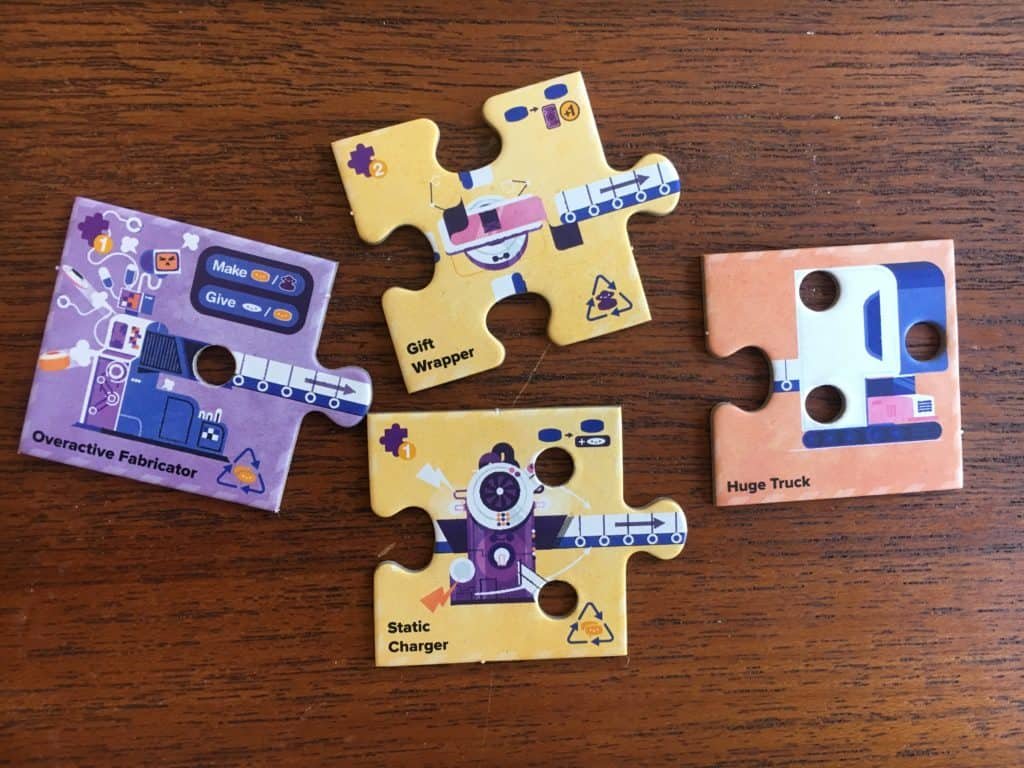
The box insert that allows you to play right out of the box is brilliant in ways, and dissapointing in others. It nearly eliminates all setup for the game, leaving the game in a constant ready-to-play state. It separates every kind of piece, and stays fairly nice, even when stored on its side.
However, the bins for the money and robots are too narrow, making it hard to find the pieces you need without riffling through them for awkwardly long. The plus-shaped puzzle piece sections in of the insert forces you to align all the puzzle pieces perfectly or they won’t fit, making it even more awkward to use than the narrow robots or money bin.
But of all the complaints in this Mechanica Review, this is the smallest. The box is better thought out than most, and actually adds to the game with the recycling mechanic.
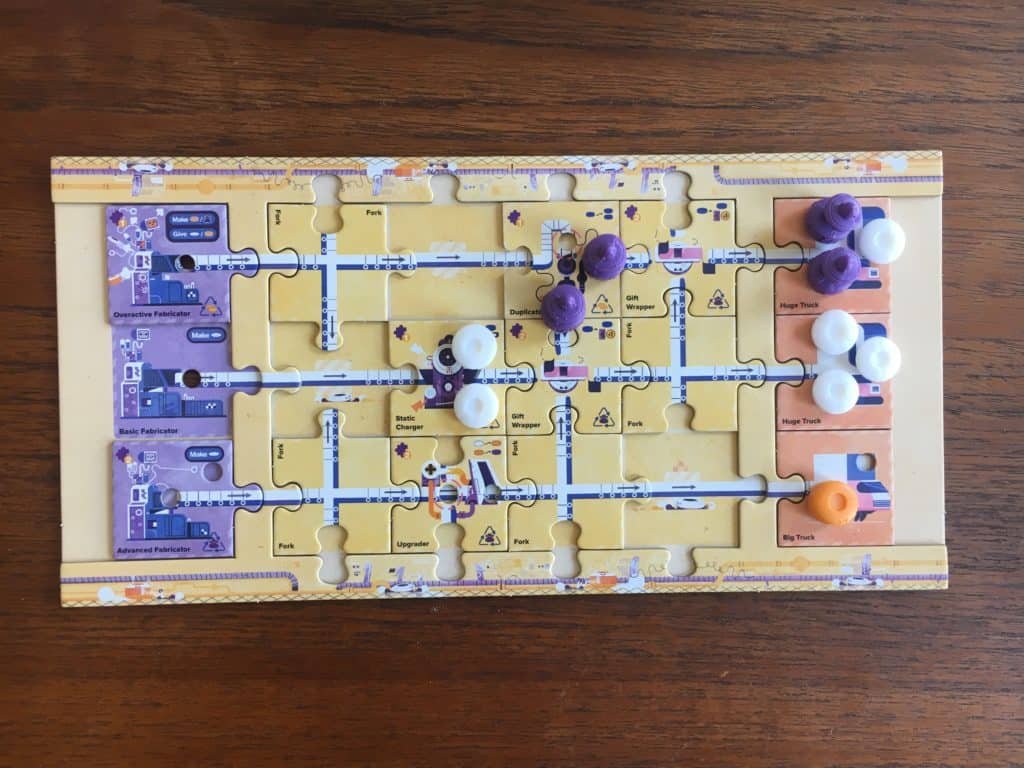
It’s common in your first games that the blueprints are very swingy, but that’s only true if your factory if scoring relatively few points. As you get better at the game, the blueprints will seem less overpowered, that is, if you invest enough time into the game until it gets to that point, and not everyone will want to with this game.
Adding more upgrades to your factory can make it worse at generating points. Additionally, upgrades can never be moved once they are placed, so between those two things, the game can be rather unforgiving.
Variability in this game can be harsh too. One game, you worry about running out of scoring tokens since everyone is making robots left and right, and the next game, no one gets the chance to buy a Fabricator for 3/4 of the game, and it crawls. That’s just the nature of the beast, unfortunately.
Not to say many of the games I’ve played have turned out that way, and sometimes, those kinds of dymanics can force players to explore different strategies.
But ultimately, in a game where planning is so central to the strategy, it feels like you can also be punished for trying to plan. I’d love to say this added tension to my plays, but I don’t really think it did.

This game also offers a solo mode, but I’ve only felt compelled to play it a few times, while I still thought there must be more to discover in the game. I won each of the three times I’ve played it solo, which puts it on the easier side of things for solo game play. Armand-o, the solo opponent, simulates an opponent by buying from the upgrades market, but you do not need to build a factory for him. Instead he scores for every tile he gets rather than going through the upkeep of using a factory.
But Armand-o, at the end of the day, felt too simple and too easy to take advantage of. Since he scores based on the score of each tile he gets, you can simply buy or recycle the most valuable tiles, leaving Armando without much going on.
One of my biggest pet peeves for solo play in games with a simulated opponent, is when the strategy changes to take advantage of the simulated opponent rather than playing how you play in the multiplayer game. And this game is very much an example of why that dynamic always ends up feeling disappointing. At the end of the game, instead of feeling like you’ve built something, it feels more like you bested a toddler, who perhaps never had a chance.
After playing against Armand-o, I do not fear the robot revolution. But I suppose your millage may vary.
At the end of the day, I don’t think I can recommend this game to everyone. The ideas are fun, the presentation is beautiful, but it struggles to be an easy game, and it struggles to be a deep game. It’s not a game you can dive right into in your first play, and it’s not a game that has many secrets to reward you with for each subsequent play. It’s caught in a middle ground that I’m not sure what to make of. It’s enjoyable, but I was always more excited by the idea of playing it than by actually playing it.
But even though I have all those problems with the game, I still think some people would truly love this game. If you enjoy planning more than anything else, I’d recommend it to you. If you find most of your joy in games from the execution of your gameplan over discovery, then I’d recommend it. If you don’t play your games many times, and enjoy a game that can feel chaotic and random in your first plays, I’d recommend it.
As I wrote this, I’m torn about how negative this review is. It’s honestly fun, and I’ve enjoyed playing it. I’ve been through this review several times, looking for what was too harsh, or undeserved, because I want to have more positive things to say here. But I suppose it’s a testament to board gaming if games can be this good, and ultimately something I wouldn’t recommend to most readers.
Perhaps this game is the sort of game who needs an expansion to become great, and if one game out today, I’m sure I’d get it, just on the off chance that it does. I’d even do another Mechanica Review in a heartbeat, just in case you’re as excited about the idea of fixing this game as I am.
The Robot revolution might be coming, but it’s not Mechanica.


